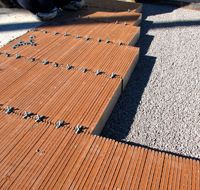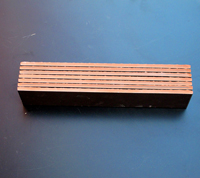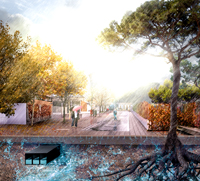Beach resort recycles spare tiles into climate-resilient drain

 |
| Drainage material from recycled tiles Photo: LIFE CERSUDS |
The municipality of Benicàssim, on the eastern coast of Spain, is pioneering a sustainable urban drainage system to evacuate torrential rain water from its town centre. Climate change is expected to increase the frequency with which heavy rainfall floods the streets of Mediterranean towns.
As part of the LIFE CERSUDS project, the project consortium has been working on a new kind of drainage system that allows water to seep through the ground, rather than build up on the tarmac.
The innovative design consists of a permeable pavement made of ceramic tiles of low commercial value. It allows water to flow across its surface, and seep through joints. Underneath the tiles, cells of polypropylene plastic carry rainwater to cisterns or into the soil.
“This prevents localised runoff,” said Celia Rodríguez from the ITC Institute of Ceramic Technology in Castellón, Spain. “Now we are optimising the productive process and demonstrating the technology in the street.”
 |
| Recycled tiles Photo: LIFE CERSUDS |
Construction work has started on one of the most flood-prone streets of Benicàssim. The town’s scenic location between the mountains and the beach exposes it to torrents of water in times of heavy rain. The CERSUDS project is incorporating a ceramic drainage system into the pavement of one particularly vulnerable street to guide excess water into the soil.
Upscaling the technology will require staggering volumes of ceramic tiles. CERSUDS has released a report detailing supply options of this ceramic materials needed to help streets and cities with climatic and productive similar characteristics across Europe adapt to climate change.
“We have estimated an stock pile of low value ceramic tiles in Spain over 5.5 million square meters,” said Celia Rodríguez.
These tiles have little commercial value once their design is dated but they remain solid and watertight. Using techniques optimised by ITC, Spanish mosaic manufacturer Trencadis carved up low-value ceramic tiles and recycled them into the permeable surfaces used in Benicàssim’s sustainable drainage system. Doing so required adapting manufacturing processes, but the result is opening a new business opportunity for the company.
 |
|
| Artist's view image: LIFE CERSUDS |
Giving spare tiles a second life also keeps them out of landfills, reinforcing the green nature of this sustainable infrastructure. Public authorities attentive to climate adaptation also tend to care about the environmental footprint of their solutions.
The municipality of Benicàssim expects construction work on its demonstration street to last some four months. Once complete, the CERSUDS project will test the new drainage systems and model its performance in similar climates in Portugal and Italy. These results will be presented alongside an action plan for town planners across Europe to follow.
Source: © European Union, 1995-2017

